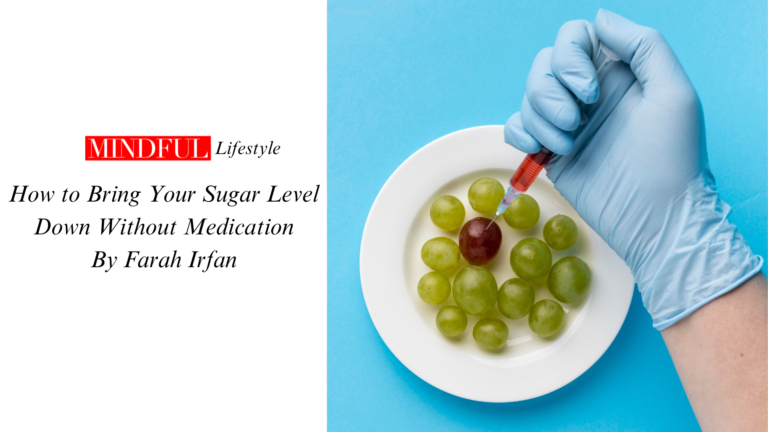A nutritional therapist and owner, Fit Like Farah
@fitlikefarah

High sugar, or hyperglycemia, refers to an elevated level of glucose (sugar) in the blood. It commonly occurs in people with diabetes when their body doesn’t produce enough insulin or cannot use insulin effectively to regulate blood sugar levels.
High sugar can also result from consuming excessive sugary or carbohydrate-rich foods, stress, illness, or certain medications.
Symptoms may include increased thirst, frequent urination, fatigue, blurred vision, and, in severe cases, nausea or confusion. If left untreated, persistent high blood sugar can lead to serious health complications such as nerve damage, cardiovascular disease, and kidney problems. Managing hyperglycemia involves dietary adjustments, regular exercise, medications, and monitoring blood sugar levels.
There are many ways to bring elevated sugar levels down without medication. Naturopaths and nutritional therapists like myself, believe that with proper guidance and lifestyle adjustments, sugar imbalances can be reversed. By following protocols and making mindful choices, lasting improvements in blood sugar control are possible.
• Choose Low-Glycemic Foods: Opt for foods with a low glycemic index (GI), such as whole grains, legumes, non-starchy vegetables, and most fruits.
• Increase Fiber Intake: Fiber slows digestion and sugar absorption. Foods like vegetables, fruits, beans, and whole grains are excellent sources.
• Eat Protein with Meals: Include lean protein (chicken, fish, tofu, eggs) to help stabilize blood sugar levels.
• Avoid Refined Carbohydrates and Sugary Foods: Limit or avoid foods like white bread, sugary drinks, and pastries that spike blood sugar.
• Control Portion Sizes: Large meals can cause blood sugar spikes. Eat smaller, balanced meals throughout the day.
• Exercise Regularly: Activities like walking, jogging, cycling, or swimming can help lower blood sugar.
• Strength Training: Building muscle helps improve insulin sensitivity and glucose utilization.
• Post-Meal Walks: A 10 to 30 minutes of walk after meals can significantly reduce post-meal glucose spikes.
• Drink Water: Staying hydrated helps the kidneys flush excess sugar through urine.
• Limit Sugary Drinks: Avoid sodas, energy drinks, and sweetened beverages and even fresh fruit juice. Choose full fruit or vegetables instead.
• Manage Stress: Meditation, yoga, and deep-breathing exercises can lower stress hormones that affect blood sugar.
• Sleep Well: Aim for 7-9 hours of quality sleep each night. Poor sleep can disrupt glucose metabolism.
By following these protocols, you can significantly lower your blood sugar without relying on medication or other interventions. However, if your sugar levels remain difficult to manage, try these three steps before considering medication:
Three Supplements to Try for Elevated Blood Sugar:
1. Apple Cider Vinger (ACV): ACV may improve insulin sensitivity and reduce blood sugar spikes after meals.
Ways to consume:
• Mix 1-2 tablespoons of raw, unfiltered ACV in a glass of water and drink it before meals.
• Use ACV as a base for salad dressings or marinades.
• Avoid consuming it undiluted to prevent irritation of the esophagus and damage to tooth enamel
2. Cinnamon: Cinnamon may improve insulin sensitivity, reducing blood sugar levels, and lowering fasting glucose. It contains compounds like cinnamaldehyde that enhance cellular glucose uptake and reduce insulin resistance. Some studies suggest it can also decrease oxidative stress and inflammation, which are common in diabetes. However, it should be used as a supplement, not a replacement for prescribed treatments.
Choose the right type:
Opt for Ceylon cinnamon (“true cinnamon”) over Cassia cinnamon, as it has lower levels of coumarin, which can be harmful in large amounts.
Dosage:
Studies suggest 1–6 grams (about 0.5–2 teaspoons) of cinnamon per day may be effective. Start with a smaller amount and increase gradually.
Ways to Consume:
• Add to Food: Sprinkle cinnamon on oatmeal, yogurt, smoothies, or baked goods.
• Cinnamon Tea: Boil a cinnamon stick in water for 10–15 minutes or add ground cinnamon to hot water.
• Timing: Take cinnamon with meals to help regulate post-meal blood sugar spikes.
• Consistency: Use it regularly for best results, but monitor your blood sugar levels and overall response.
3. Probiotic Rich Foods:
Probiotics support gut health, which is increasingly linked to better glucose metabolism and reduced inflammation. Improved gut microbiota may enhance insulin sensitivity.
Ways to consume:
– Water Kefir: A naturally fizzy drink made from water and kefir grains, rich in probiotics.
Drink ½ to 1 cup daily, preferably in the morning or between meals.
– Kanji: A fermented Indian drink made from carrots, mustard seeds, and water.
Consume ½ to 1 cup daily, especially as a refreshing mid-meal drink.
– Sauerkraut: Fermented cabbage, high in probiotics and fiber.
Add 2-3 tablespoons to salads, sandwiches, or as a side dish.
– Other Fermented Foods: Unsweetened yogurt, kimchi, or pickled vegetables are also excellent additions to your diet.
Consistency is Key! By regularly implementing these protocols, you can help keep your blood sugar in check without the need for medication.
Stay committed to these habits, and over time, you should experience healthier, more balanced blood sugar levels.



